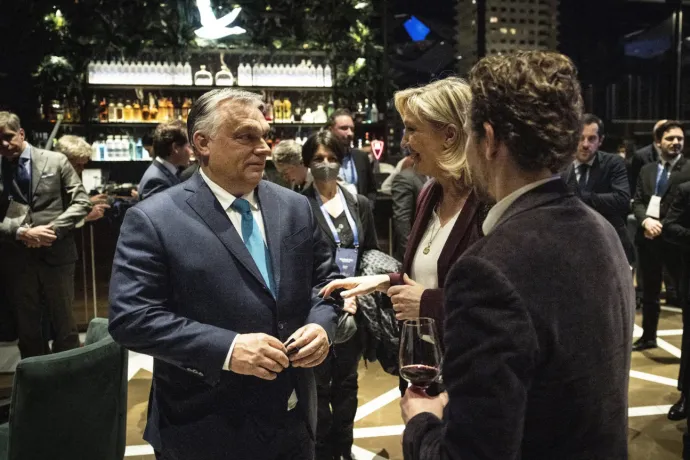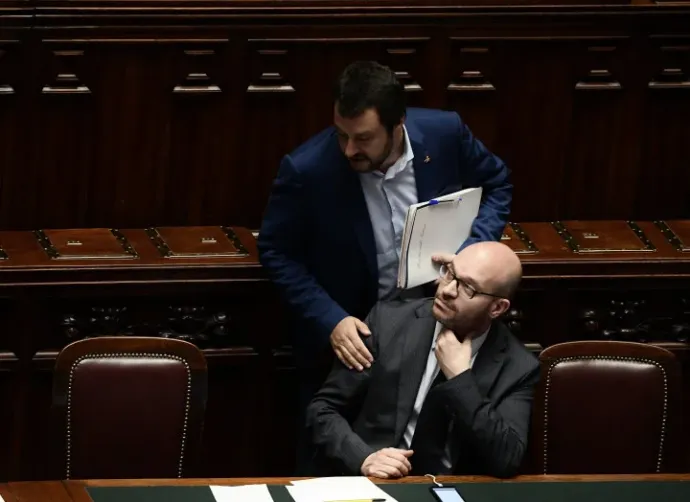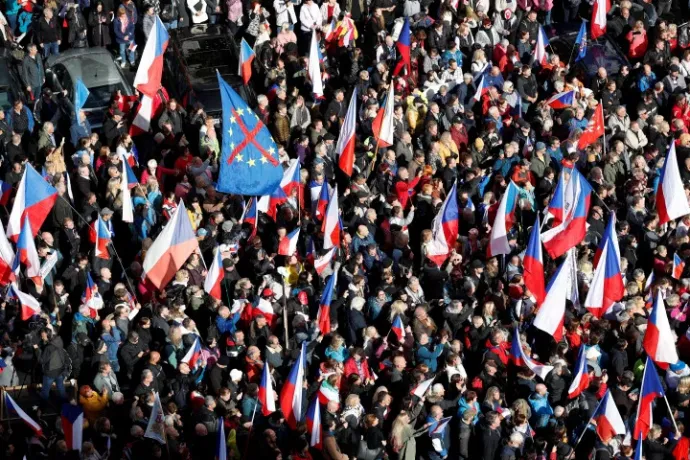Orbán's potential anti-sanctions coalition in Europe is pretty thin

Hungary's ruling party, Fidesz has long been blaming the European Union's economic sanctions against Russia for Hungary's exceptionally high inflation. Prime Minister Viktor Orbán has recently been calling on the EU to abandon the punitive measures even as Russia continues to occupy parts of Ukraine and conduct attacks on civilian targets, arguing that the sanctions hurt Hungary and the EU more than Russia.
This message has recently been amplified by a poster campaign depicting the sanctions as a bomb – even though prices had already started sprialing out of control in Hungary well before the war in Ukraine due to the loose monetary policy of the Hungarian National Bank and the government's pre-election handouts. Orbán has also been critizing the EU and NATO for ‘fuelling the war’ by sending weapons to Ukraine, and asserted that European governments are acting against their own interests by sanctioning Russian oil exports.
Blaming the sanctions for rising prices is not a unique position in Europe, as a number of typically smaller far-right and far-left opposition parties are also calling for the lifting of the sanctions in other EU member states. They include France's Marine Le Pen, the Austrian and German far-right, the heirs of the East German communist state party, and one of the three members of the future Italian governing coalition.
However, Orbán is alone among EU governments in his fierce opposition to punishing Russia. The only other EU member state where the government has shown some willingness to accomodate Moscow is Bulgaria – but even there this is a strange consequence of a long political stalemate.
Orbán can always trust Le Pen and Salvini
A prominent proponent of Orbán's ideas is Marine Le Pen, leader of the French far-right National Rally, whose presidential bid this year was financed through a loan from MKB Bank of Hungary. MKB is linked to Lőrinc Mészáros, Orbán's childhood friend and Hungary's richest person, who amassed his fortune by winning billions of euros worth of public procurement contracts.
Le Pen has long been a comrade-in-arms of both Orbán and Russian President Vladimir Putin and used Russian money to fund her previous campaign before MKB's help. The Russian connection proved to be uneasy for her before this year's election, when she sought to move towards the political centre and condemned the Russian invasion of Ukraine to boost her chances of taking the presidency. After losing the second round of the presidential election, however, Le Pen went back to the old script. Like Orbán, she asserts that sanctions are damaging Europe, opposes the EU and the United States supplying arms to Ukraine, and has echoed the words of the Fidesz establishment in calling the Western world warmongers.
In France, the left has also held massive demonstrations over the sharp rise in utility bills, but they have blamed the cost of living crisis not specifically on EU sanctions, but rather on President Emmanuel Macron.
Matteo Salvini, leader of the Italian far-right Lega party and an old ally of Orbán's has also been hitting similar notes as the Hungarian Prime Minister and has repeatedly called for the lifting of the sanctions in recent weeks. Salvini's statements carry weight because Lega is part of the three-party right-wing coalition that won the general elections at the end of September in Italy.

However, Giorgia Meloni, the prime minister-in-waiting and leader of the Brothers of Italy, a party with post-fascist roots, condemned Russia's war in Ukraine before the elections and declared unwavering support for NATO and the EU. The third member of the coalition, the media czar Silvio Berlusconi's Forza Italia has also sought to distance itself from its Putin-adjacent past – although Berlusconi has spoken out about how he believes Putin was forced into the war, blamed Ukraine for the Russian invasion and said in a recording which came to light this week that he was corresponding with the Russian president again.
Protests here and there
The Czech Republic saw tens of thousands demonstrating against the sanctions in events organised by pro-Russian, anti-EU and anti-government forces during the early Autumn. „The government is totally anti-Czech. It serves only Brussels, American interests and NATO. It ignores the Czech people,” one of the protesters said. Far-right symbols and flags of the Czech Communist Party were seen at the demonstration, but no major political party backed the protests.

Croatian President Zoran Milanovic has also said that the sanctions are harming his country and has declined to authorise the training of Ukrainian soldiers in Croatia. The Croatian government, however, continues to support the EU's measures and does not share the concerns of the head of state, who has limited powers.
In Austria, it is the far-right Freedom Party (FPÖ) that is taking a page out of Orbán's playbook, saying that EU sanctions are threatening economic disaster and Western arms supplies to Ukraine are escalating the war. Even so, the opposition far-right party has little influence on Austrian politics since it was removed from power after a Russian-linked scandal in 2019.
Far-right and far-left
The German far-right has also taken a position similar to Orbán's. The leadership of the Alternative for Germany (AfD) says that the German government is waging an economic war against its own population and has called for the immediate lifting of the sanctions, with Russian flags appearing alongside German ones at the party's rallies.
Orbán's ideas have received support at the other end of the German political spectrum as well, in the ranks of The Left (Die Linke), a party that grew partly out of the remnants of the East German state party, although it has since become much tamer. One of the party's leaders, Sahra Wagenknecht, recently said that the sanctions were „pushing millions of German families into poverty” and destroying the German industry and should be lifted immediately.
In general, the rhetoric of the old-fashioned far-left in Western Europe stuck in Soviet nostalgia and blaming American imperialism for all the world's problems, and of the far-right praising Putin as the defender of conservative, masculine normality, tends to be quite close. A poll published this summer shows that far-left and far-right parties in the European Parliament take a more accommodating stance towards Moscow thant the political centre.
The anti-American, anti-EU, pro-Putin and pro-China rants of the ruling party Fidesz establishment in Hungary – which were called out directly by the US embassy recently – bring them to the same foreign policy platform as portions of both the far-left and the extreme right.
However, surveys also show that attitudes towards Russia have soured among the European right wing supporters in the wake of the invasion of Ukraine. According to the Pew Research Center, in Italy, 64 percent of Lega voters had a positive opinion of Russia in 2020, compared to 15 percent today; the share of positive opinions at the French National Front have dropped from 55 to 21 percent, at Vox in Spain from 40 to 12 percent, at the the Flemish National League in Belgium from 41 to 14 percent, and the Party for Freedom in Holland from 37 to 12 percent.
Meanwhile, the Swedish and Finnish right-wing populists, the Swedish Democrats and the Finns party are explicitly anti-Russian, and even acquiesced to their country's NATO accession. The war in Ukraine has also driven a sharp wedge between the Polish ruling party, Law and Justice (PiS) and Fidesz, even though the two parties were staunch allies – and both face disciplinary action from the European Commission for their assault on democratic checks and balances.
Orbán did not invent the protection of national interests
As we have previously analysed in detail, the Hungarian government's claim that EU and US sanctions „don't work” and „hurt Europe more than Russia” is highly questionable. Russia's narrowing budget and falling energy revenues suggest that the sanctions will make it harder to finance the war in the coming months, while some of the longer-term effects of financial and trade restrictions will ravage the Russian economy for years to come.
Orbán's argument that all European heads of government except him are acting against the interests of their nations is also weak. Numerous EU governments are taking a pragmatic approach to sanctions and, while not proclaiming it from the housetops as Orbán does, they are trying to exempt certain sectors of their economies from being barred from dealing with Russia. Belgium resists restrictions on diamond trading, Greece on shipping services, Cyprus on shipping-related insurance and financial services, and France on uranium imports, among others.
But no other government politicians have sought to attack the sanctions with the purpose of boosting their support base or to promote their ideological agenda.
The only other EU member state besides Hungary where the government has been becoming friendlier towards Putin is Bulgaria, although that is a result of fairly special circumstances. While Bulgaria is heavily dependent on Russian energy imports and has enjoyed close relations with the Russian regime in the past, the Bulgarian government has stuck to the EU line since the invasion of Ukraine, condemning Moscow and agreeing to energy sanctions without major skirmishes (although they requested and were granted exemption from the oil embargo against Russia, just like Hungary).
However, the political stalemate in Bulgaria has elevated the role of the pro-Russian president, Rumen Radev, and has led to accusations of a pro-Russian turn by the caretaker cabinet appointed by him.
While Bulgaria is a parliamentary democracy with a limited political role for the head of state, the legislature failed to produce a stable government even after the country has held four general elections in the past year and a half. As a result, the the government is now led by a temporary cabinet appointed by President Radev, who has previously been a harsh critic of EU sanctions and condemned arms transfers to Ukraine. Some analysts say that since Radev's appointees have been at the helm of the country, the caretaker government has moved visibly closer to Moscow, and the former prime minister, Kiril Petkov, has also accused them of being pro-Russian. The on-going domestic political stalemate means that Radev's men could be in power for a long time to come.
The translation of this article was made possible by our cooperation with the Heinrich Böll Foundation.
For more quick, accurate, and impartial news from and about Hungary, subscribe to the Telex English newsletter!